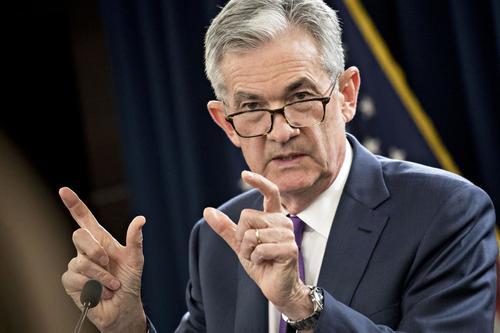"Everything transitory is but an image…"
The biggest risk to markets have always been policy mistakes by central banks and/or governments. The risks are rising as confusions about inflation abound. The reality is Central banks have tripped themselves – by assuring us inflation was transitory, they've pretty much nailed on its permanence!
Policy Mistake Risk and Inflation
Early doors y'day I was listening to Professor David "Danny" Blanchflower on the radio – ex Bank of England economist and Monetary Policy Committee member. He made a telling comment about the news BoE Governor Andrew Bailey is pushing for a rate hike at the November 4th MPC rate-setting meeting – dismissing every single rate hike since 2007 as a "policy mistake". He's spot on. He also reckons a deep recession is about to hit the US – based on his analysis of consumer anxiety and fears – and if the US catches a cold, then the UK will be thumped!
"Is the BoE about to make a policy mistake? Markets sure seem to think so", says a senior portfolio manager at Allianz this morning in the FT: "Investors worry over potential BoE rates 'mistake'. Hmm…. Imagine that.. and investor who has figured out rising rates aren't necessarily good for his book? Who would have guessed.. ?
Policy mistakes are a massive market risk. Don't believe Central Banks and Politicians are omnipotent. The issue is defining what would be a policy mistake and what is a POLICY MISTAKE.
For instance; Financial Assets remain seriously distorted by the consequences of the last 10 years of QE and ultra-low interest rates. It would be a policy mistake not to unravel the multiple negative market consequences of bad policy. However, to do so – by tapering QE purchases, raising interest rates, and causing investors to question the implicit put they think Central Banks have given markets – will likely trigger a market tumble, and thus be a policy mistake.
It becomes a Policy Mistake when Central Banks give up trying to pull the wool over our eyes about "transitory inflation" (the market equivalent of being a little bit pregnant), yet hike rates into the face of a supply chain recession, spurred on by Governments wanting to rein back debt by introducing austerity programmes and tax hikes. That's a combined central bank policy mistake and a political Policy Mistake = triggering a run on the currency caused by rising competency fears about the debt they are trying to cut which will herald and imported inflation spike.. Etc, etc…
On the other hand, the most recent US retail sales data was exceptionally strong – was it a real spending splurge by consumers following the pandemic, or was it retail stocking up in the expectation of shortages to come?
Blanchflower and many other economists are still in the transitory inflation cap, citing US Lumber prices earlier this year – which spiked higher as builders hoarded timber on anticipated shortages, but quickly fell as the demand spike proved unsustainable.
Which leads to the question when does a price spike lead to transitory or long-term inflation? Retail Prices tend to demonstrate fluidity on the way up, but are notoriously sticky once they peak. Central banks might think the prices retail consumers encounter in the shops respond to stimulus like bond prices – they don't.
Rising prices clearly colour expectations and purchase decisions. If folk accept inflation is transitory they will just keep buying – which means prices remain high.
Doh! – you see the problem…?
Belief in something being transitory is likely to make it permanent. If prices remain high that triggers wage inflation. Etc, Etc. Jay Powells comments on "Transitory Inflation" might just go down alongside Alan Greenspans "If you understood me, I misspoke" comments in the Big Book of Central Bank Moments.
I guess the coming holiday spending season will be .. interesting… Container ports around the globe remain clogged up, lorry drivers are scarcer than hen's teeth, labour costs are under pressure (I'll be intrigued to see what Amazon et al pay their Christmas hires this year..), and supply chain glitches put manufacturing under pressure… just how transitory do you expect it all to be?
Meanwhile, big trouble in big China
The market flow yesterday confirmed we are certainly living in interesting times…. China's sub 5% growth raised recessionary fears around the globe… 4.9% growth would be considered stellar in most developed economies, but the fact China is struggling with supply chains, soaring energy costs, and the unfolding Evergrande debacle and potential contagion is illustrative.
I suspect our view of the implosion of the Chinese property sector is a bit like watching ducks on a windy day – serenely floating on the surface looking unperturbed, but furiously paddling below the waterline. It's worse than it looks. The realisation of just how heavily dependent the economy is on property sales – looks unsustainable.
The consensus is $50 bln held by Evergrande bond holders will suffer most. Domestically, it's a different tale; even as more property firms default the CCP will try to ensure the real estate sector is "stable and orderly". Evergrande's domestic liabilities of some $148 bln plus will no doubt be dealt with in order not to unleash a tide of domestic business defaults and retail pain – but it will have to be done in a manner that doesn't look like a bailout.
It's likely to get messy. The Chinese will find trying to micromanage the property sector by simultaneously disciplining banks on property company lending, while encouraging mortgage lending to mop up surplus supply creates all kinds of opportunities for speculators. Keep an eye on that space.. I suspect China will continue to contract. When China catches a cold, the rest of us will probably break out in pustules…

Commenti
Posta un commento